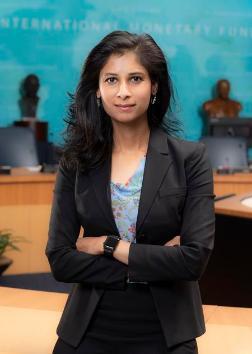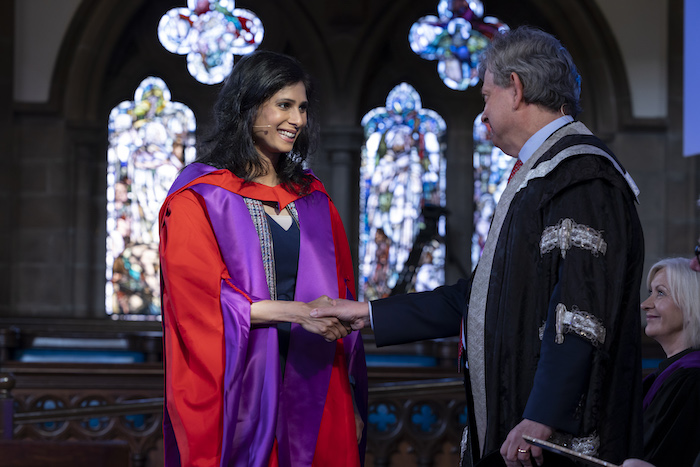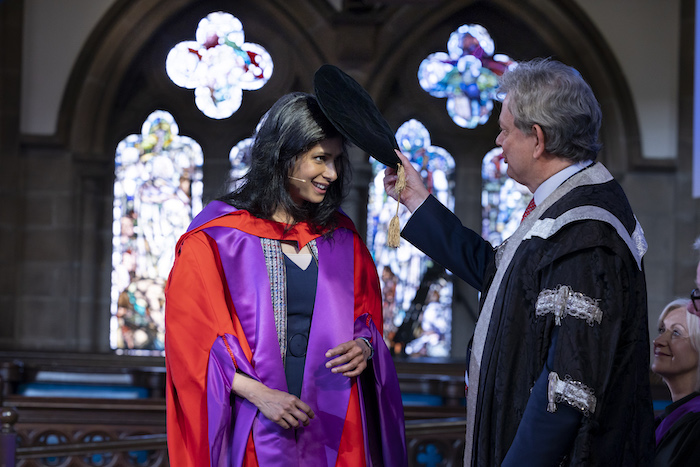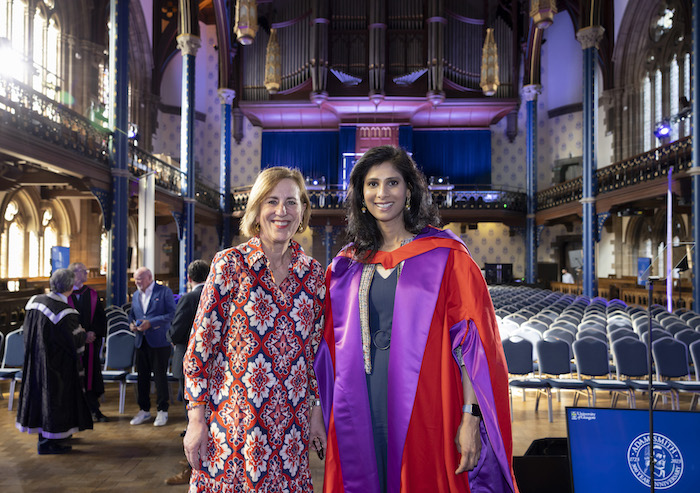The Power and Perils of the “Artificial Hand”: Considering AI Through the Ideas of Adam Smith’

Gita Gopinath, First Deputy Managing Director of the International Monetary Fund, presented the first talk of the Hunter Lecture Series for Tercentenary Week.
Her lecture focused on Artificial Intelligence (AI), and what Adam Smith’s response would have been, if he was alive today. Gita considered AI against the context of Smith’s thoughts on industrialisation, globalisation, market power and monopolisation, and regulation.
"New technology and AI could change our lives in spectacular and possibly existential ways - it could even redefine what it means to be human."
With predictions that AI could maximise global output by 7% (Goldman Sachs), Gita pointed out when it comes to maximising efficiency, Adam Smith no doubt would be wary of stifling the 'invisible hand' of AI. However, given his concerns for the plight of the worker, and his interest in an economy that benefits all, he would have been concerned about the impact it could have on employment.
Gita concluded that harnessing AI for the good of humanity will require an interdisciplinary approach.
"Humans aren't known for walking away from the next stage of technological or scientific progress; we usually muddle through. We need to summon up every ounce of our empathy, the very things that make human intelligence so special."
She was then joined for a lively fireside conversation by Kirsty Wark, BBC Newsnight presenter, to further explore the themes of her talk, discussing the challenges, opportunities, and debunking the myths around AI, while also responding to questions from the audience in Bute Hall and online.
Gita was also awarded an Honorary Doctorate by the University.
Prior to taking up the role of First Deputy Managing Director Gita Gopinath held the post of Chief Economist of the International Monetary Fund and was a Professor at Harvard University Economics Department. She was also named amongst the Financial Times most influential women in 2021.
Read the full text of her lecture on the IMF website
Image credit: © International Monetary Fund
Reactions
'#AI could change our lives in spectacular ways & even redefine what it means to be human...
— Emma Gilmartin (@embrooksy8) June 5, 2023
We must be prepared to address its broader effects on our economies & time is of the essence'
Glad to listen @GitaGopinath keynote online - part of #AdamSmith300 tercentenary week. pic.twitter.com/ese55lnInL
'What we need is another enlightenment!'
— University of Glasgow (@UofGlasgow) June 5, 2023
A privilege to have @KirstyWark join @GitaGopinath for a fireside chat exploring the themes of Gita's talk on AI, discussing concerns, opportunities, global debt and debunking the myths.
#AdamSmith300 @IMFNews @THunterF @UofGSocSci pic.twitter.com/FML8YTxCpw
The Hunter Foundation lecture series
The Hunter Foundation Lecture Series form part of the University of Glasgow's Adam Smith Tercentenary celebrations which mark the 300th anniversary of one of our most famous alumni, whose pioneering work has had a lasting impact on the way the world considers economics, politics and society.
The events in the series touch on what Adam Smith would say about the state of globalisation.
Sir Tom Hunter, entrepreneur, philanthropist and founder of The Hunter Foundation has noted:
"As the founding father of modern economics, it's important we celebrate Smith’s role in the Enlightenment and learn from his legacy. It is our hope in supporting the University of Glasgow’s Adam Smith 300 lecture series, that we as a nation reassess business creation and its role in supporting the public services we all rely upon. Without the economic growth business delivers, those services, as we are already seeing, diminish and those least well off in our society suffer the most."





